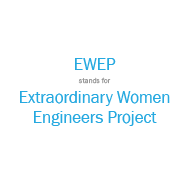The Extraordinary Women Engineers project (EWEP)

The Extraordinary Women Engineers project (EWEP) is a national initiative to encourage girls to consider pursuing a degree and subsequent career in engineering. The project is led by a coalition of the country’s engineering associations and the American Association of Engineering Societies (AAES), the American Society of Civil Engineers (ASCE), and WGBH Educational Foundation.
Formed in Spring 2004, the coalition began with a review of the question, “Why are academically prepared girls not considering or enrolling in engineering degree programs?” We know the issue is not one of ability or preparation. Researchers Huang, Taddese, and Walter found that girls are taking high school science and math courses at approximately the same rate as boys: 94% of girls and 91% of boys take biology, 64% of girls and 57% of boys take chemistry, 26% of girls and 32% of boys take physics, and 64% of girls and 60% of boys take algebra II. We believe that the problem is one of perception. Girls and the people who influence them—teachers, school counselors, parents, peers, and the media—do not understand what a career in engineering looks like and therefore don’t consider it as a career option.
Key Findings
What do high school girls think about engineering?
High school girls believe engineering is for people who love both math and science. They do not have an understanding of what engineering is. They do not show an interest in the field nor do they think it is “for them.”
Is there a gender divide in engineering?
The common understanding among all audiences is that engineering is perceived to be a man’s profession and there is little to no encouragement for girls to consider engineering.
What are career motivators for high school girls?
Professional interests for high school girls hinge upon relevance. Relevance incorporates that a job is rewarding, and it suggests that the profession is for someone “like me.” Girls want their job to be enjoyable, have a good working environment, make a difference, offer a good salary, and be flexible.
Who are the career influencers for high school girls? Parents, peers, educators, and the media are reported to be key influencers and resources for information gathering. What do the career influencers say about engineering? Career influencers, including educators, are not familiar with how to guide students toward engineering. The positive stories about engineering are not being told to this audience.
What messages is the engineering community sending to high school students?
Current engineering messages portray engineering as challenging and stress the importance of superior math and science abilities. These messages are not relevant to this audience. Messages do not include the benefits and rewards of being an engineer. What messages about engineering will resonate with high school students? High school girls react positively to personal and informational stories that tell more about the engineering lifestyle. They are interested in learning how engineering aligns with their career motivators—enjoyable, good working environment, making a difference, good income, and flexibility. The most effective messages use examples that contain multiple career motivators.
Strategic Recommendations
To achieve the project’s goal of increasing the number of academically prepared girls who pursue an education and subsequent career in engineering, we recommend a fundamental shift in the way engineering is portrayed. Rather than focusing on the process and challenges of becoming an engineer, we recommend a focus on the benefits and rewards of being an engineer as they relate to the career motivators identified by the girls in this assessment.
To do this, the EWEP coalition recommends the following actions:
· Facilitate a dialogue within the engineering community on the need to redefine engineering as a desirable career option for academically prepared high school girls.
· Develop and test messages that illustrate engineering as a career that complements and supports community interests, family interests, and self-interests.
· Create materials using these tested messages to promote engineering to high school girls
· Create training opportunities and resources engineers can use to promote engineering education and careers to girls, their parents, and educators.
· Create training opportunities and resources school counselors and teachers can use to promote engineering education and careers to girls and their parents.
